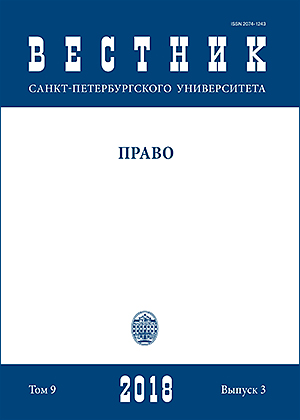Chinese revolutions and codification of Chinese civil legislation
DOI:
https://doi.org/10.21638/11701/spbu14.2018.311Abstract
It is well known that the French Civil Code of 1804 (the Code of Napoleon) is one of the results of the Great French Revolution of 1789–1794. But not only France is an example of the largest transformation of the economic, social and legal systems of the state. The civil codified laws of countries such as Germany (the German Civil Code of 1896), Japan (the Japanese Civil Code of 1898), the USSR (the Civil Code of the RSFSR of 1922, the Civil Code of the Ukrainian SSR of 1922), are also the consequence of the Revolution of 1848–1849, the Meiji Revolution, the Great October Socialist Revolution, fundamental changes in the political, social and economic systems. A new round of codification of civil legislation, begun in some countries at the end of the 20th century, is still conditioned by the rejection of the initial political and economic system and the transition to a market economy system. Unlike ancient Rome, where the private law was the main, in traditional Chinese society, the criminal law was the main law and all civil disputes were resolved with its help. The codification of Chinese civil (private) legislation, namely, the adoption of the Civil Code of the Republic of China in 1929–1931, is also connected with the revolutionary processes at the end of the Qing Dynasty, which led to a change in the old millennial system (Xinhai Revolution of 1911). For more than 30 years, the PRC has pursued a policy of reform and openness and is still on the road to a developed market economy and the establishment of a strong system of private rights. In the historical conditions, when the state economy is the main one and “socialist property is inviolable,” the draft of the Civil Code of the PRC inevitably must give supremacy to the rights of citizens and legal entities.
Keywords:
civil code, civil rights, current legal regulations, legal reforms in China, revolution, basic values, historical significance
Downloads
References
Downloads
Published
How to Cite
Issue
Section
License
Articles of "Vestnik of Saint Petersburg University. Law" are open access distributed under the terms of the License Agreement with Saint Petersburg State University, which permits to the authors unrestricted distribution and self-archiving free of charge.






